A-levels: Top grades down, but more university places
- Published
The BBC's Branwen Jeffreys: "For the first time there is no limit on university recruitment"
The proportion of top A-level grades has fallen slightly this year, but record numbers have been accepted on university courses.
A* and A grades were awarded to 25.9% of entries, down from 26% last year. But in a year of "stable" results, passes rose by 0.1 percentage point.
The Ucas university admissions service says 409,000 places have been confirmed, up 3% on last year.
Universities minister Jo Johnson hailed the rising numbers as "great news".
Hundreds of thousands of teenagers in England, Wales and Northern Ireland are receiving their A-level results on Thursday.
The exam boards say that the number of A-levels taken this year has risen to over 850,000, with maths, English and biology the most popular. There was a sharp increase in pupils taking computing.
A-level results, 2015
25.9%
received A or A* grade
98.1%
overall pass rate (A-E) - up 0.1 percentage point
-
8.2% received A* grade - no change on last year
-
409,000 degree places confirmed, up 3 percentage points
-
13,415 more female entrants in 2015 than last year
"The over-riding message from this year's figures is one of stability. There have been no significant changes to the system," said Michael Turner, director of the Joint Council for Qualifications.
The overall pass rate has risen marginally to 98.1% and the proportion getting the very top A* grade remained the same at 8.2%, with A grades down by 0.1%.
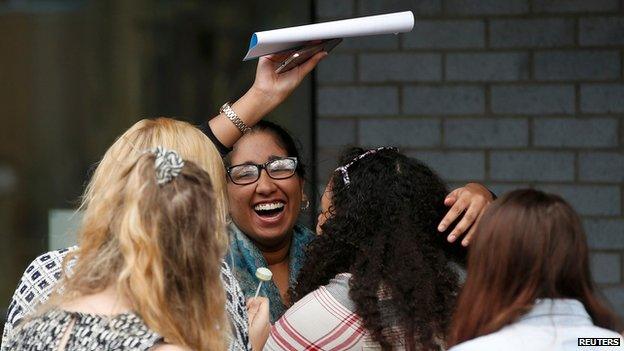
For many students it has been a day of celebration
Schools minister Nick Gibb said the results showed the impact of the government's drive for "core academic subjects" with a 20% increase in maths entries since 2010.
"As a result thousands more pupils, from all backgrounds, are studying subjects that will secure them a place at a top university or an apprenticeship and that will help to secure well paid employment," said Mr Gibb.

Chris Keates, leader of the Nasuwt teachers' union, said that the results showed that the "gold standard" A-level system had been maintained, despite the pressure on schools to prepare for forthcoming changes to exams.
The ASCL head teachers' union said that it was "disappointing" to see a decline in some subjects, such as music, German and design and technology. Heads linked the decline to budget pressures making it difficult to sustain subjects with smaller numbers of pupils.
The British Council highlighted the further fall in pupils taking French and said the numbers taking languages were "disappointingly low".
The CBI director general, John Cridland, emphasised the importance of providing high status vocational options for students.
"For too long vocational choices have been seen as the understudy to academic subjects, but this simply won't wash anymore. Vocational qualifications should have the same A-level brand, which is well-respected by businesses," said Mr Cridland.
Gender gap
But this year's lifting of the cap on university places in England has seen more students than ever accepted on to courses.
Ucas chief executive Mary Curnock Cook says demand and supply for university spaces are "in balance"
Initial figures from Ucas show a 5% increase in places for 18 year olds in the UK, but a reduction among older age groups.
The gender gap has widened further, with 27,000 more women than men about to start university courses this year.
The number of international students and from the European Union has also increased.

A-level results
What if my grades are disappointing?
Results Day: It was different in my day...
A-level expert advice
Newsbeat listeners send in their experiences
Analysis: What lessons can be drawn from this year's results?
Northern Ireland: Pass rate rises

With no fixed limit on the number of places universities are permitted to offer, there is likely to be more competition for students.
In the run-up to results day, some universities have been attempting to secure students on to courses by revising conditional offers into unconditional ones.
Clearing
Any unallocated university places will be matched with students with the right grades through the process known as Clearing.
Pam Tatlow, chief executive of the Million+ university group, said Clearing would not be too different from previous years, despite the removal of the cap on student numbers.
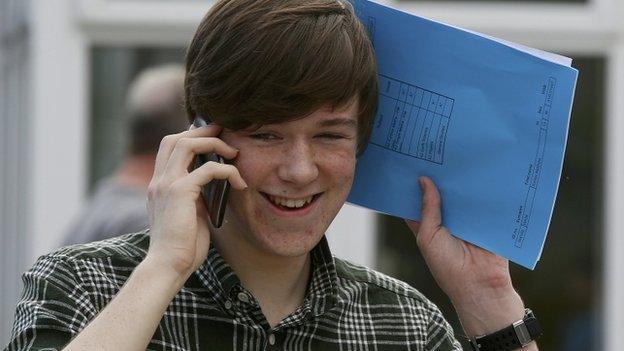
A pupil at Winstanley College in Wigan shares news about his results
"A lot of activity has gone on before Clearing in terms of unconditional offers, and as usual there will be competition and students will have choices to make," she said.
"Students will have to keep calm and think about what is the right course for them."
Labour's shadow education secretary Tristram Hunt warned that there still needed to be more effort to get female students to take science subjects.
"We still waste far too much potential. These results remind us that progress on increasing the number of young women taking subjects like physics, maths and computing is still too slow."
Nansi Ellis, assistant general secretary of the Association of Teachers and Lecturers, congratulated students and teachers on the results.
"Although this year's results are stable, this is unlikely to be the case when the A-level reforms kick in and all A-levels are only assessed by end of course exams."
- Published13 August 2015
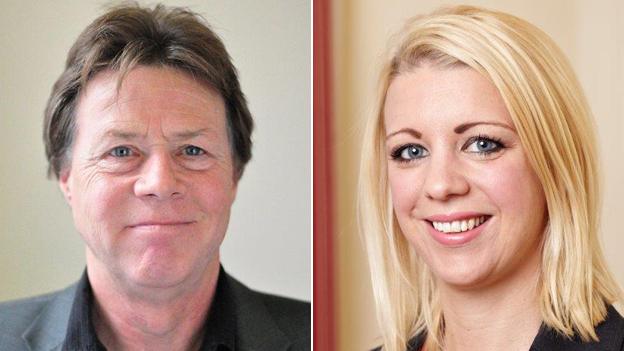
- Published13 August 2015
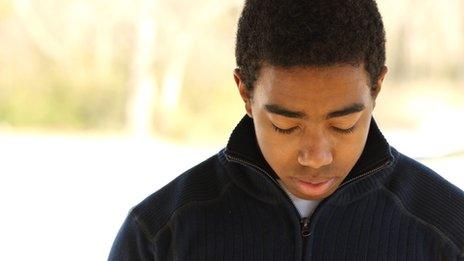
- Published5 August 2015
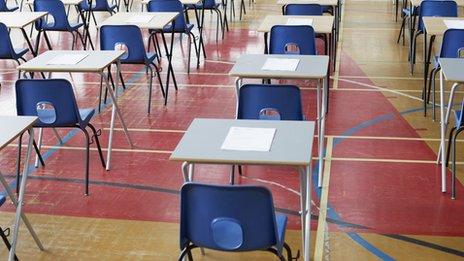
- Published13 August 2015
